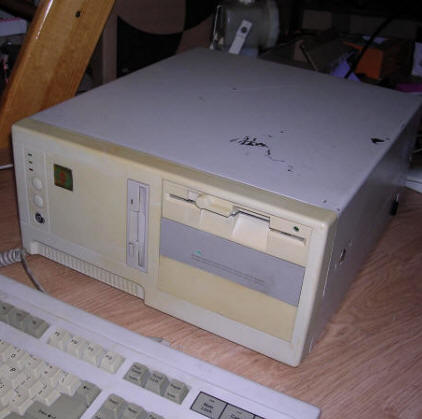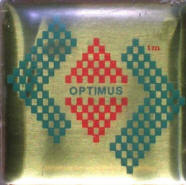In the history of Polish computers, Optimus company is
definitely worth describing. It was established in 1988 and imported
components to build PCs. Later they expanded to embedded systems, shop
terminals, multimedia / educational software and "Onet" internet portal,
a very popular information source in Poland. Now remains of Optimus
company are known as CD Projekt studios.
In late 1980s and early 1990s, socialism in Poland ended and private
companies started to grow. Companies which evolved from "International
ventures" failed very quickly as computers built from imported chips
were not fast and compatible enough to compete with PC clones. Most
successful businesses were related to importing boards and assembling
computers. Optimus was one of such companies, some parts were imported,
in early years some were made from scratch (e.g. cases), but PCs were
assembled in Poland. Optimus flooded market with wide range of
accessible PCs. There were ready sets, with strict specifications, as
well as PCs built to order. Everyone could satissfy needs, using ready
specification or composing own one. The quality was not perfect -
Taiwanese parts in early 1990s were not very reliable, but were good
enough to sell computers cheaper and most used units still hold in one
piece. Optimus importing business ended in early
2000s by arresting their owner, then releasing after there was nothing
to manage in company. Well, it turned out that communism hasn't ended
totally in Poland.
This is an older PC, made around 1992 with Harris 286 processor.
It has 1MB of RAM and 40MB IDE disk drive. Video card is Hercules one,
with Polish character EPROM installed to add Polish diacritized
characters support in Mazovia standard. As in many PCs from this age,
there are two floppy drives - 3.5" and 5.25", as both disk
formats were used
these times. Another interesting thing is hard disk, it's a 3.5" IBM
disk drive with 3.5-to-5.25" converter. Although casing has HDD LED,
front panel of converter has its own light connected to hard disk's LED
connector. I think that earlier versions of PCs with this casing had
ST225-like disks, and my unit is one of the next series, but not ones
with totally embedded disk. It is
definitely a high-end 286, Harris CPUs were one of the fastest and not
all 286s had IDE disk drives. It may be one of the last 286 computers
made by Optimus.
| Manufacturer | Optimus | |
| Origin | Taiwan / Poland (assembly) | |
| Year of unit | 1992 | |
| Year of introduction | 1992? | |
| Class | AT | |
| CPU | 286 (Harris) | |
| Speed | 20MHz / 8MHz | |
| RAM | 1MB (640kB + 384kB) Expandable by DIP or 30-pin SIMM modules |
|
| ROM | AMI BIOS System diagnostics built-in. |
|
| Graphics | Hercules-compatible | |
| Sound | PC Speaker | |
| System expansion bus | ISA 16-bit (6 slots) ISA 8-bit (1 slot) |
|
| Floppy/removable media drives | 1x 360kB 5.25" drive 1x 1.44MB 3.5" drive |
|
| Hard disk: | IDE 40MB IBM WDA-L42S (C/H/S: 1067/2/39) | |
|
Peripherals in collection: |
||
| Other boards:
|
GW451C serial/parallel/game port expansion. IDE-V4-002 IDE/FDD controller |
|
| Non-standard expansions: | None | |
| Operating system(s): | MS-DOS 6.22 |
| Contents: | Starting, usage | Configuration |
Starting
The machine boots to a conventional AMI BIOS, then tries floppy drives and in the end hard disk. To enter Setup, press Del at boot. It should display menu for diagnostics, setup or restart.
In diagnostics, most hard disk-related functions are destructive.
Mainboard is Taiwanese HT-12S, configuration is in TH99. If computer runs unstable, try to change frequency - with good memory chips, it can go up to 20MHz.






